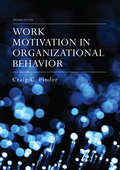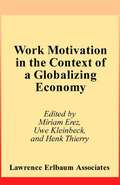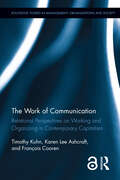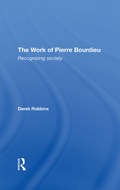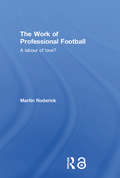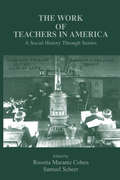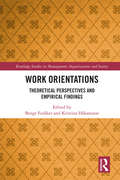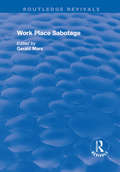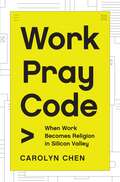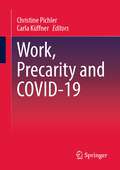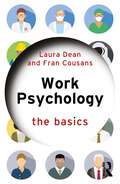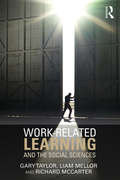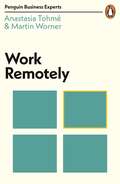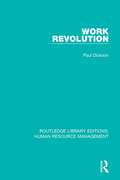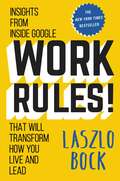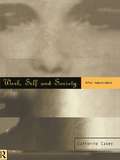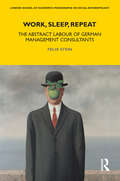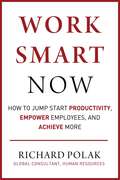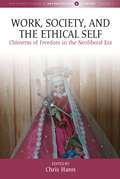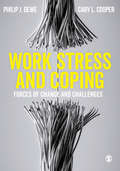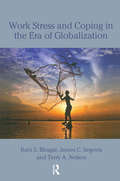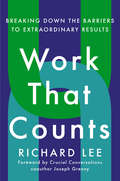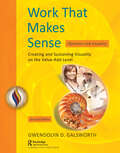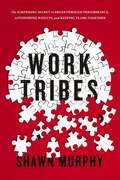- Table View
- List View
Work Motivation in Organizational Behavior: Theory, Issues And Applications (Scott, Foresman Series In Organizational Behavior And Human Resources Ser.)
by Craig C. PinderThis second edition of the best-selling textbook on Work Motivation in Organizational Behavior provides an update of the critical analysis of the scientific literature on this topic, and provides a highly integrated treatment of leading theories, including their historical roots and progression over the years. A heavy emphasis is placed on the notion that behavior in the workplace is determined by a mix of factors, many of which are not treated in texts on work motivation (such as frustration and violence, power, love, and sex). Examples from current and recent media events are numerous, and intended to illustrate concepts and issues related to work motivation, emotion, attitudes, and behavior.
Work Motivation in the Context of A Globalizing Economy
by Miriam Erez, Uwe Kleinbeck and Henk ThierryWork Motivation in the Context of a Globalizing Economy evolved from a work motivation conference held in Israel, attended by a group of internationally renowned scholars. These scholars were given the charge of creating a vision of motivation research for the 21st century. Coming from different parts of the world, the scholars represent a wide range of perspectives from the very micro focus on the individual level of motivation, through the meso level of groups and organizations, and up to the macro level of culture. The authors provide an entry to the book by summarizing several mega-trends manifest across all of the chapters and identifying several emerging trends that are left for future research.
The Work of Communication: Relational Perspectives on Working and Organizing in Contemporary Capitalism (Routledge Studies in Management, Organizations and Society)
by Timothy Kuhn Karen L Ashcraft Francois CoorenThe Work of Communication: Relational Perspectives on Working and Organizing in Contemporary Capitalism revolves around a two-part question: "What have work and organization become under contemporary capitalism—and how should organization studies approach them?" Changes in the texture of capitalism, heralded by social and organizational theorists alike, increasingly focus attention on communication as both vital to the conduct of work and as imperative to organizational performance. Yet most accounts of communication in organization studies fail to understand an alternate sense of the "work of communication" in the constitution of organizations, work practices, and economies. This book responds to that lack by portraying communicative practices—as opposed to individuals, interests, technologies, structures, organizations, or institutions—as the focal units of analysis in studies of the social and organizational problems occasioned by contemporary capitalism. Rather than suggesting that there exists a canonically "correct" route communicative analyses must follow, The Work of Communication: Relational Perspectives on Working and Organizing in Contemporary Capitalism explores the value of transcending longstanding divides between symbolic and material factors in studies of working and organizing. The recognition of dramatic shifts in technological, economic, and political forces, along with deep interconnections among the myriad of factors shaping working and organizing, sows doubts about whether organization studies is up to the vital task of addressing the social problems capitalism now creates. Kuhn, Ashcraft, and Cooren argue that novel insights into those social problems are possible if we tell different stories about working and organizing. To aid authors of those stories, they develop a set of conceptual resources that they capture under the mantle of communicative relationality. These resources allow analysts to profit from burgeoning interest in notions such as sociomateriality, posthumanism, performativity, and affect. It goes on to illustrate the benefits that investigations of work and organization can realize from communicative relationality by presenting case studies that analyze (a) the becoming of an idea, from its inception to solidification, (b) the emergence of what is taken to be the "the product" in high-tech startup entrepreneurship, and (c) the branding of work (in this case, academic writing and commercial aviation) through affective economies. Taken together, the book portrays "the work of communication" as simultaneously about how work in the "new economy" revolves around communicative practice and about how communication serves as a mode of explanation with the potential to cultivate novel stories about working and organizing. Aimed at academics, researchers, and policy makers, this book’s goal is to make tangible the contributions of communication for thinking about contemporary social and organizational problems.
The Work Of Pierre Bourdieu: Recognizing Society
by Derek RobbinsThis book seeks to offer a chronological account of the development of Pierre Bourdieu's thinking. It is intended to guide readers towards and through the original texts and attempts to represent the French meaning of Bourdieu, hence the concentration on the French chronology.
The Work of Professional Football: A Labour of Love?
by Martin RoderickA long-term study providing rare insights into the precarious career and ordinary working culture of professional footballers. Away from the celebrity-obsessed media gaze, the work of a professional footballer is rarely glamorous and for most players a career in football is insecure and short-lived. A former professional, Martin Roderick’s familiarity with the world of football is the foundation for this privileged research into a world that is typically closed to the public gaze and ignored by media reportage and academic research which prefers to focus on a small, unrepresentative group of elite players. Key themes explored within the text include: the culture of work in professional football the changing identity, orientation and expectations of players during their careers the fragile and uncertain nature of professional sport careers the performance and dramatic aspects of a career under public scrutiny the role of relationships with managers, owners, support staff and partners players' responses to the insecurities inherent in professional football such as injury, ageing, performance and transfer. The text deals with a wide range of issues of interest to sports students and academics, particularly those with a focus on the sociology of sport but also including sport development, sport management and coaching studies. The text will also be of interest to researchers in the fields of careers, industrial relations and the sociology of work.
The Work of Teachers in America: A Social History Through Stories
by Rosetta Marantz Cohen Samuel ScheerThis volume presents a complex portrait of the American teacher through a fascinating range of "story" narratives, including fictional short stories, poetry, diaries, letters, ethnographies, and autobiographies. Through these stories, the volume traces the evolution of the teacher and the profession over the course of two centuries -- from the late 1700s to the late 1900s. In depicting the profession over time, the authors include stories by and about both male and female teachers, as well as teachers from a wide range of cultural and ethnic backgrounds, including white, black, Hispanic, Asian-American, immigrant and native-born, and gay and straight. This book offers accessible, comprehensive introductions to both the central ideas associated with each period and to the representative individual stories that are included within it. The volume editors connect each of the parts to earlier and later ones by tracing evolving themes of feminization, teacher activism, conceptions of curriculum and discipline, and issues of multiculturalism. Questions, suggested readings, and activities are offered at the end of each section. Photographs and drawings -- retrieved from state historical archives -- provide telling images of the teacher in each of the four periods.
Work Orientations: Theoretical Perspectives and Empirical Findings (Routledge Studies in Management, Organizations and Society)
by Bengt Furåker Kristina HåkanssonWork orientations and work attitudes have to do with the productive capacities in society. Insofar as individuals are positively oriented towards contributing their labour, we can expect a great amount of work to be done and to be carried out efficiently, carefully and responsibly. These subjective factors are thus very vital in modern working life. Work Orientations: Theoretical Perspectives and Empirical Findings offers up-to-date research on people’s commitment to work and employment and job satisfaction in economically advanced countries. It will also analyse changes that have taken place in these respects over the last decades. Among the key issues in Work Orientations are questions about whether patterns of work centrality and employment commitment tend to remain stable or have changed across time in various countries. Moreover, we assume that the circumstances under which people participate in the social division of labour colour their subjective relationships to their jobs and to employment in general. A major aim of the book is to explore the impact of factors such as occupation, education, age and gender on work orientations and work attitudes. Work Orientations will be invaluable for researchers and scholars in the fields or organizational studies, the sociology of work, employee engagement and related disciplines.
Work Place Sabotage (Routledge Revivals)
by Gerald MarsThis title was first published in 2001. The examples cited in this study of sabotage in the working environment range from sophisticated tricks played in Western factories to natural reactions to inferior or unhealthy working practices in, for example, Malaysia and India. The book contains articles from various contributors which cover numerous topics within the subject including crime and punishment in the factory, employee and organizational sabotage, and management techniques to prevent sabotage.
Work Pray Code: When Work Becomes Religion in Silicon Valley
by Carolyn ChenHow tech giants are reshaping spirituality to serve their religion of peak productivitySilicon Valley is known for its lavish perks, intense work culture, and spiritual gurus. Work Pray Code explores how tech companies are bringing religion into the workplace in ways that are replacing traditional places of worship, blurring the line between work and religion and transforming the very nature of spiritual experience in modern life.Over the past forty years, highly skilled workers have been devoting more time and energy to their jobs than ever before. They are also leaving churches, synagogues, and temples in droves—but they have not abandoned religion. Carolyn Chen spent more than five years in Silicon Valley, conducting a wealth of in-depth interviews and gaining unprecedented access to the best and brightest of the tech world. The result is a penetrating account of how work now satisfies workers’ needs for belonging, identity, purpose, and transcendence that religion once met. Chen argues that tech firms are offering spiritual care such as Buddhist-inspired mindfulness practices to make their employees more productive, but that our religious traditions, communities, and public sphere are paying the price.We all want our jobs to be meaningful and fulfilling. Work Pray Code reveals what can happen when work becomes religion, and when the workplace becomes the institution that shapes our souls.
Work, Precarity and COVID-19
by Christine Pichler Carla KüffnerThe anthology presents the social consequences of the COVID-19 pandemic in the field of work and gainful employment from a multidisciplinary perspective of social and economic sciences. Specifically, it deals with the analysis of changes in work processes and relations in the course of the COVID-19 pandemic. Different facets of the discussion are taken up, and the topic of "work, precarity and COVID-19" is discussed along a wide range of diversity categories (age, gender, disability, social origin, ethnicity, religion, etc.) and their intersections (intersectionality). At the same time, the focus is on discussing alternative models and ways of dealing with the current crisis that (re)establish social justice and inclusion through work.The translation was done with the help of artificial intelligence. A subsequent human revision was done primarily in terms of content.
Work Psychology: The Basics (The Basics)
by Laura Dean Fran CousansWork Psychology: The Basics provides an accessible, jargon-free introduction to the fundamental principles of work and occupational psychology. Covering key theories and models in this dynamic area, it offers a solid understanding of both academic theory and practical applications. The book follows the structure of the British Psychological Society curriculum for Masters courses, exploring psychological assessment at work, learning, training and development; wellbeing at work, work design, organisational change and development, and leadership, engagement and motivation. These core topics are supplemented by deep dives into the development of the discipline, research and practice in the field, and suggestions for the future of work psychology. Giving a detailed look into the world of work, it answers questions such as: Can we accurately select people for jobs? How can work positively and negatively affect mental and physical health? How can we motivate people in the workplace? What makes a good leader? It also explores issues around types of research and what effective research looks like in this area. Supported by a helpful guide on the routes to chartership in the UK and working in the area, as well as a glossary of key terms and suggestions for further reading, this is the ideal introductory text for students. It will also interest those looking to understand the subject more generally and complete training in the area.
Work-Related Learning and the Social Sciences
by Gary Taylor Liam Mellor Richard McCarterWork-Related Learning and the Social Sciences provides a clear and accessible introduction to the theory and practice of work. Written in a student friendly style, it makes use of the following: Theoretical Perspectives: The theoretical foundations of identity, power, community, citizenship, experiential learning and a range of employability skills provide frameworks for the chapters. Key issues: The book addresses such issues as: How are people socialised at work? Why does conflict occur at work? What types of control are exerted at work? What can we learn about our communities from the work we do? How can we develop our employability skills? Sector examples: Extensive use is made of examples of the working practices of teachers, social workers, police officers, civil servants, third sector workers as well as from people engaged in low skilled work. The student voice: The student voice draws upon the relationship between their own experiences of work and the key issues covered in the book. Written as an introductory text for students studying the social sciences, it deals with the ways in which students can appreciate the sociology and politics of work and develop an understanding of their own skills and employability. This book is particularly relevant to students studying work-related learning as part of their social science degrees and to those who wish to enhance their employability and prospects in graduate level employment.
Work Remotely (Penguin Business Experts Series)
by Anastasia Tohmé Martin WornerRemote working makes us happier, more productive and more profitable, but it can bring its own set of challenges. How do we manage our work-life balance; communicate and collaborate effectively as teams; and ensure our technology is efficient?In Work Remotely, Penguin Business Experts Anastasia Tohmé and Martin Worner explain everything you need to know:- Set your own targets and monitor productivity- Establish boundaries between working hours and free time- Manage effective communication and decision-making at a distanceIncluding case studies from the companies around the world who are innovating and revolutionizing the way we work, Work Remotely shares useful advice and practical tips to ensure you get the most out of working away from the office environment.
Work Revolution (Routledge Library Editions: Human Resource Management)
by Paul DicksonIn this book, first published in 1975, the author critically examines the organisation of work, the systems of control, and the patterns of authority in British establishments. By bringing together detailed descriptions of alternative forms of work organisation and management from Norway, Sweden, Denmark and the USA, Paul Dickson provokes considerable thought as to the extent to which these models could be developed and applied in the UK. This title will be of interest to students of business studies and human resource management.
Work Rules!: Insights from Inside Google That Will Transform How You Live and Lead
by Laszlo BockNEW YORK TIMES BESTSELLER WALL STREET JOURNAL BESTSELLER From the visionary head of Google's innovative People Operations--a groundbreaking inquiry into the philosophy of work and a blueprint for attracting the most spectacular talent to your business and ensuring the best and brightest succeed. "We spend more time working than doing anything else in life. It's not right that the experience of work should be so demotivating and dehumanizing. " So says Laszlo Bock, head of People Operations at the company that transformed how the world interacts with knowledge. This insight is the heart of WORK RULES!, a compelling and surprisingly playful manifesto with the potential to change how we work and live. Drawing on the latest research in behavioral economics and with a profound grasp of human psychology, Bock also provides teaching examples from a range of industries--including companies that are household names but hideous places to work, and little-known companies that achieve spectacular results by valuing and listening to their employees. Bock takes us inside one of history's most explosively successful businesses to reveal why Google is consistently rated one of the best places to work in the world, distilling 15 years of intensive worker R&D into delightfully counterintuitive principles that are easy to put into action, whether you're a team of one or a team of thousands. Cleaving the knot of conventional management, some lessons from WORK RULES! include: Take away managers' power over employees Learn from your best employees--and your worst Only hire people who are smarter than you are, no matter how long it takes to find them Pay unfairly (it's more fair!) Don't trust your gut: use data to predict and shape the future Default to open: be transparent, and welcome feedback If you're comfortable with the amount of freedom you've given your employees, you haven't gone far enough WORK RULES! shows how to strike a balance between creativity and structure, leading to success you can measure in quality of life as well as market share. Read it to build a better company from within rather than from above; read it to reawaken your joy in what you do.
Work, Self and Society: After Industrialism
by Catherine CaseyDespite recent interest in the effects of restructuring and redesigning the work place, the link between individual identity and structural change has usually been asserted rather than demonstrated. Through an extensive review of data from field work in a multi-national corporation Catherine Casey changes this. She knows that changes currently occurring in the world of work are part of the vast social and cultural changes that are challenging the assumptions of modern industrialism. These events affect what people do everyday, and they are altering relations among ourselves and with the physical world. This valuable book is not only a critcal analysis of the transformations occurring in the world of work, but an exploration of the effects of contemporary practices of work on the self.
Work, Sleep, Repeat: The Abstract Labour of German Management Consultants (LSE Monographs on Social Anthropology)
by Felix SteinWork, Sleep, Repeat is a fascinating account of the work regime of German management consultants. Examining one of the most sought-after – and secretive – graduate professions, the book provides a first-hand account of the boardroom culture of Europe’s strongest economy. Analyzing how knowledge and power operate in this sector, Felix Stein explores a number of paradoxes. For example, while it is the job of management consultants to analyse the activities of other employees, they actually spend most of their time in luxurious seclusion away from them. In addition, despite having a strong sense of the importance of their work, consultants often find it difficult to explain to outsiders what it is they do. The book addresses these and other paradoxes by arguing that consultants are engaged in abstract labour. Anthropologists have long struggled with the question of how to describe contemporary work regimes which do not produce anything tangible. Stein demonstrates that elite work is predominantly abstract, in the fourfold sense that it is epistemically removed from the object of analysis, emotionally detached from it, several steps away from the assumed sources of economic value creation, and increasingly hard to grasp. In doing so, he offers new ways to think about white collar work and elites in the 21st century and establishes the notion of ‘abstract labour’ as a key category in social anthropology.
Work Smart Now: How to Jump Start Productivity, Empower Employees, and Achieve More
by Richard PolakFrom one of the top HR specialists in the world comes this much-needed guide to help people maximize productivity and increase revenue. Whether it&’s in corporate America or in our own living rooms, people are wasting time. From the minute we wake up and check our Facebook page or emails—before we even crawl out of bed—to late at night when we stay up longer than we should, watching our favorite show. There&’s a precise moment that falls between working enough hours to be productive and working too many hours, yielding a diminishing marginal return. The difference between the person able to master this and most Americans that fail miserably at it is quality of life! If one continues to work past this moment, a negative return will ensue, and that negative return produces guilt. It lowers the amount of time for recreational activities and spending time with family. We&’ve siloed productivity to our work life, however; the impact on our personal life is often loss. An alarming 39% of workers in high-tech companies believe they are depressed, as reported by PC Magazine in December 2018. 72% of people who have daily stress and anxiety say it interferes with their lives—anxiety and stress alone have reduced productivity by 56%. More than 80% of people have experienced some form of anxiety, stress, or depression in the workplace. People are spending more time at work than at home or with their loved ones; or, if they are at home, they are working. They are always &“on.&” As a result of this disparity, people are not fully living their lives. And the &“work-life balance&” marketed by some HR consulting firms and employers simply does not work. It&’s all work and no life! Studies have also proven that when people are unhappy in their personal lives or careers, their productivity goes down and everything and everyone around them suffers. This causes a domino effect, which trickles into every area of their lives. Previous generations used to say, &“Work harder,&” but we&’ve now learned we must &“work smarter.&” Polak has practiced and tested his methods in hundreds of opportunities and has been paid millions by the largest corporations in the world to share these tools. He feels that every individual and business should have these tools, and will share them with us here.
Work, Society, and the Ethical Self: Chimeras of Freedom in the Neoliberal Era (Max Planck Studies in Anthropology and Economy #7)
by Chris HannPrimarily on the basis of ethnographic case-studies from around the world, this volume links investigations of work to questions of personal and professional identity and social relations. In the era of digitalized neoliberalism, particular attention is paid to notions of freedom, both collective (in social relations) and individual (in subjective experiences). These cannot be investigated separately. Rather than juxtapose economy with ethics (or the profitable with the good), the authors uncover complex entanglements between the drudgery experienced by most people in the course of making a living and ideals of emancipated personhood.
Work Stress and Coping: Forces of Change and Challenges
by Dr Philip J. Dewe Dr Cary P. CooperLecturers/Instructors - Request a Free digital inspection copy HERE In Work Stress and Coping the authors provide an historical account of workplace stress, taking a broad approach by integrating the macro forces impacting the micro, and highlighting what the research in the field tells us about the changing nature of work so that individuals and organisations can create more liveable working environments. With an emphasis on the growing influence of globalization, the book explores the forces of change within contemporary societies and assesses how they have fundamentally changed the nature of work and the direction of research into stress and coping. Capturing the history, context, critique and transformation of theory into practice, the authors offer an insight into how managers and businesses have failed, the effects this has had on how work is experienced, the evolution and relevance of existing theories and suggest alternative methods and future directions. Suitable reading for students of HRM, Organisational Behaviour and Occupational Psychology.
Work Stress and Coping: Forces of Change and Challenges
by Dr Philip J. Dewe Dr Cary P. CooperLecturers/Instructors - Request a Free digital inspection copy HERE In Work Stress and Coping the authors provide an historical account of workplace stress, taking a broad approach by integrating the macro forces impacting the micro, and highlighting what the research in the field tells us about the changing nature of work so that individuals and organisations can create more liveable working environments. With an emphasis on the growing influence of globalization, the book explores the forces of change within contemporary societies and assesses how they have fundamentally changed the nature of work and the direction of research into stress and coping. Capturing the history, context, critique and transformation of theory into practice, the authors offer an insight into how managers and businesses have failed, the effects this has had on how work is experienced, the evolution and relevance of existing theories and suggest alternative methods and future directions. Suitable reading for students of HRM, Organisational Behaviour and Occupational Psychology.
Work Stress and Coping in the Era of Globalization
by Rabi S. Bhagat Terry Nelson James SegovisThis book examines the phenomena of how individuals experience work stress and coping in both developed and developing countries in the world. Rabi Bhagat, known for his cross-cultural scholarship in this area, and his co authors, help us recognize the causes and consequences of work stress. They present a systematic, comprehensive review of this topic with plenty of practical insights and case studies examining work stress and coping in the era of globalization. Researchers, practitioners and students in the field of industrial organizational psychology, organizational behavior, and human resources management will find this book of interest.
Work That Counts: Breaking Down the Barriers to Extraordinary Results
by Richard LeeOne of Silicon Valley's top leadership trainers distills his proven framework that has empowered teams at the world's most innovative companies--from Google and Facebook to Cisco Systems and biotech giant Genentech/Roche--to do the best work of their lives.Richard Lee has worked with thousands of ambitious leaders and their teams, and has found that they all share the same frustration. Whether it's because of communication breakdowns or increasing complexity, people at every level of an organization feel like their results fall short of their expectations--even though they are putting in a lot of effort.Management gurus will tell you that you need to overhaul your entire organization in order to maximize its full potential, but that is simply not true: You only to give your people the tools to succeed inside it.The framework outlined in Work That Counts draws on examples from teams he has worked with at the world's most cutting edge, disruptive companies, and provides practical solutions to the problems that hold people back in nearly every organization. Among other critical skills, you'll learn: • How a team leader can hold team members accountable without micromanaging--and what team members need to do concurrently to earn the team leader's trust. • How to get support for your objectives from other teams, even when they don't report to you or your division or your business unit. • How to partner with others, within your team and on other teams, to achieve the results you want.Work That Counts is a commonsense yet groundbreaking guide, filled with assessments and real-world examples that will empower organizations to make the most of their people and become more than the sum of their parts.
Work That Makes Sense: Operator-Led Visuality, Second Edition
by Gwendolyn D. GalsworthThis book presents the mechanics of implementing visuality on the value-add level known as Work That Makes Sense (WTMS). The step-by-step WTMS process described in this book teaches operators a proven method for translating information deficits into visual solutions that take the struggle out of their day-to-day work. As a result, operators transform their work area into a work environment that speaks—a work environment that, by design, shares vital information in the form of visual devices that help them perform their day-to-day work with precision and completeness. At the heart of this visual conversion approach is an element unique to Galsworth’s paradigm called I-driven that recognizes that operators will pursue self-leadership in the company’s improvement initiatives if they are given the opportunity to learn how to do so. Also recognized is the fact that this can only happen if associates are taught—and given the opportunity to learn and apply a new system of thinking. The author calls this new system visual thinking. This book provides that learning pathway, in detail, supported by hundreds of actual visual solutions, developed by operators who have followed that pathway and become visual thinkers for themselves—I-driven. They become self-leaders, in control of their corner of the world and able and willing to share their strengths with others. In this way, the WTMS process produces a deep and abiding change in the company’s work culture that builds creativity and ownership. As a result, the organization’s leadership framework widens to include operators. When effectively applied the WTMS process detailed in this book produces 15% to 30% improvement in local KPIs, including productivity, on-time delivery, quality, and costs; these figures are documented and presented in the pages of this book. Written for operators, this book includes a wealth of color photographs, the majority of which are visual solutions created by visual thinkers who have lived this process for themselves. All are fully captioned and thoughtfully described. The book also includes twelve tasks that managers implement in support that they seek on the operator level. WTMS teaches that visual devices translate information into exact behavior, embedding and sustaining precision through visual solutions. Precision is built in by the same operators who execute it. This is the heart of an I-driven visual enterprise. Once learned and operationalized, this paradigm allows the organization to take on any new improvement effort. Organizational alignment and teamwork have been redefined and operationalized.
Work Tribes: The Surprising Secret to Breakthrough Performance, Astonishing Results, and Keeping Teams Together
by Shawn MurphyAre you building a typical team… or a high-performance tribe? The motivational power of the desire to belong is the key element for ensuring employee satisfaction and retention, as well as your company’s long-term success.With millions of exhausted employees “living for Friday,” the place we spend most of our time--our workplace--is drudgery. But what happens when leaders revive the workplace by tapping into a hardwired human need? That need, a sense of belonging, can resuscitate employee satisfaction and retention, while also contributing to a company’s long-term success. Employees want more than a job. They want an opportunity to solve essential problems and receive fair pay and benefits. While some companies use slick culture tricks to attract and retain employees, a more meaningful experience can be created by fostering a sense of belonging. How can businesses achieve this? In his new book Work Tribes, Shawn Murphy, CEO of WorqIQ and a sought-after leadership speaker, shows readers how to tap into the motivational pull of belonging. Based on findings from his interviews with leaders and employees at companies such as LinkedIn, The Container Store, Canlis Restaurant, and Barry-Wehmiller, Work Tribes reveals why a human-centered approach is more aligned with the way we work in the twenty-first century. Astonishing outcomes result from making your employees feel welcomed, wanted, and valued--and this book will show you how to transform your team into a unified tribe.
